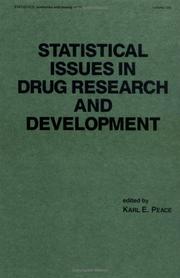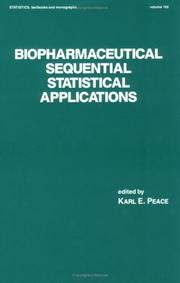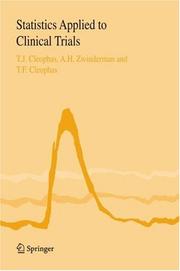| Listing 1 - 7 of 7 |
Sort by
|

ISBN: 0824782909 Year: 1990 Volume: vol 106 Publisher: New York Basel Dekker
Abstract | Keywords | Export | Availability | Bookmark
 Loading...
Loading...Choose an application
- Reference Manager
- EndNote
- RefWorks (Direct export to RefWorks)
Mathematical statistics --- Drugs --- Research --- Testing --- Statistical methods --- Drugs - Testing - Statistical methods. --- Drugs - Research.

ISBN: 0824786289 Year: 1992 Volume: vol 128 Publisher: New York Basel Hong Kong Dekker
Abstract | Keywords | Export | Availability | Bookmark
 Loading...
Loading...Choose an application
- Reference Manager
- EndNote
- RefWorks (Direct export to RefWorks)
Biomathematics. Biometry. Biostatistics --- Mathematical statistics --- Analyse sequentielle --- Sequential analysis --- Sequentiele analyse --- Drugs --- Testing --- Statistical methods --- Drugs - Testing - Statistical methods. --- Sequential analysis.
Book
ISBN: 9781584889847 1584889845 9780429191862 Year: 2010 Volume: 33 Publisher: Boca Raton, FL : Chapman & Hall/CRC,
Abstract | Keywords | Export | Availability | Bookmark
 Loading...
Loading...Choose an application
- Reference Manager
- EndNote
- RefWorks (Direct export to RefWorks)
Mathematical statistics --- Drugs --- Testing --- Statistical methods --- Méthode statistique --- Industrie pharmaceutique --- pharmaceutical industry --- Médicament --- drugs --- Essai clinique --- Clinical trials --- Clinical Trials as Topic. --- Statistics as Topic. --- Statistical methods. --- Drugs - Testing - Statistical methods --- Clinical Trials as Topic --- Statistics as Topic
Book
ISBN: 1402095228 904818147X 9786611954789 1281954780 1402095236 9781402095221 Year: 2009 Publisher: Dordrecht : Springer Netherlands : Imprint: Springer,
Abstract | Keywords | Export | Availability | Bookmark
 Loading...
Loading...Choose an application
- Reference Manager
- EndNote
- RefWorks (Direct export to RefWorks)
In clinical medicine appropriate statistics has become indispensable to evaluate treatment effects. Randomized controlled trials are currently the only trials that truly provide evidence-based medicine. Evidence based medicine has become crucial to optimal treatment of patients. We can define randomized controlled trials by using Christopher J. Bulpitt’s definition “a carefully and ethically designed experiment which includes the provision of adequate and appropriate controls by a process of randomization, so that precisely framed questions can be answered”. The answers given by randomized controlled trials constitute at present the way how patients should be clinically managed. In the setup of such randomized trial one of the most important issues is the statistical basis. The randomized trial will never work when the statistical grounds and analyses have not been clearly defined beforehand. All endpoints should be clearly defined in order to perform appropriate power calculations. Based on these power calculations the exact number of available patients can be calculated in order to have a sufficient quantity of individuals to have the predefined questions answered. Therefore, every clinical physician should be capable to understand the statistical basis of well performed clinical trials. It is therefore a great pleasure that Drs. T. J. Cleophas, A. H. Zwinderman, and T. F. Cleophas have published a book on statistical analysis of clinical trials. The book entitled “Statistics Applied to Clinical Trials” is clearly written and makes complex issues in statistical analysis transparant.
Clinical trials --Statistical methods. --- Drugs --Testing --Statistical methods. --- Drugs --- Clinical trials --- Clinical Trials as Topic --- Data Interpretation, Statistical --- Methods --- Investigative Techniques --- Evaluation Studies as Topic --- Epidemiologic Study Characteristics as Topic --- Decision Support Techniques --- Health Care Evaluation Mechanisms --- Analytical, Diagnostic and Therapeutic Techniques and Equipment --- Epidemiologic Methods --- Public Health --- Quality of Health Care --- Environment and Public Health --- Health Care Quality, Access, and Evaluation --- Health Care --- Pharmacy, Therapeutics, & Pharmacology --- Medical Research --- Mathematical Statistics --- Medicine --- Mathematics --- Health & Biological Sciences --- Physical Sciences & Mathematics --- Statistical methods --- Testing --- Statistical methods. --- Medicaments --- Medications --- Medicine (Drugs) --- Medicines (Drugs) --- Pharmaceuticals --- Prescription drugs --- Mathematics. --- Probabilities. --- Statistics. --- Probability Theory and Stochastic Processes. --- Biomedicine general. --- Statistics for Life Sciences, Medicine, Health Sciences. --- Statistics, general. --- Bioactive compounds --- Medical supplies --- Pharmacopoeias --- Chemotherapy --- Materia medica --- Pharmacology --- Pharmacy --- Distribution (Probability theory. --- Medicine. --- Statistical analysis --- Statistical data --- Statistical science --- Econometrics --- Clinical sciences --- Medical profession --- Human biology --- Life sciences --- Medical sciences --- Pathology --- Physicians --- Distribution functions --- Frequency distribution --- Characteristic functions --- Probabilities --- Statistics . --- Biomedicine, general. --- Health Workforce --- Probability --- Statistical inference --- Combinations --- Chance --- Least squares --- Mathematical statistics --- Risk --- Drugs - Testing - Statistical methods --- Clinical trials - Statistical methods

ISBN: 1402042299 1402005695 9786610460861 1402046502 9401003378 1280460865 1402005709 Year: 2002 Publisher: Dordrecht : Springer Netherlands : Imprint: Springer,
Abstract | Keywords | Export | Availability | Bookmark
 Loading...
Loading...Choose an application
- Reference Manager
- EndNote
- RefWorks (Direct export to RefWorks)
In 1948 the first randomized controlled trial was published by the English Medical Research Council in the British Medical Journal. Until then, observations had been uncontrolled. Initially, trials frequently did not confirm hypotheses to be tested. This phenomenon was attributed to low sensitivity due to small samples, as well as inappropriate hypotheses based on biased prior trials. Additional flaws were recognized and subsequently were better accounted for: carryover effects due to insufficient washout from previous treatments, time effects due to external factors and the natural history of the condition under study, bias due to asymmetry between treatment groups, lack of sensitivity due to a negative correlation between treatment responses, etc. Such flaws, mainly of a technical nature, have been largely corrected and led to trials after 1970 being of significantly better quality than before. The past decade has focused, in addition to technical aspects, on the need for circumspection in planning and conducting of clinical trials. As a consequence, prior to approval, clinical trial protocols are now routinely scrutinized by different circumstantial bodies, including ethics committees, institutional and federal review boards, national and international scientific organizations, and monitoring committees charged with conducting interim analyses. This book not only explains classical statistical analyses of clinical trials, but addresses relatively novel issues, including equivalence testing, interim analyses, sequential analyses, and meta-analyses, and provides a framework of the best statistical methods currently available for such purposes. The book is not only useful for investigators involved in the field of clinical trials, but also for all physicians who wish to better understand the data of trials as currently published.
Mathematical statistics --- Clinical trials --- Drugs --- Etudes cliniques --- Médicaments --- Statistical methods --- Testing --- Méthodes statistiques --- Essais cliniques --- Drugs - Testing - Statistical methods. --- Data Interpretation, Statistical --- Clinical Trials as Topic --- Epidemiologic Study Characteristics as Topic --- Evaluation Studies as Topic --- Decision Support Techniques --- Statistics as Topic --- Health Care Evaluation Mechanisms --- Epidemiologic Methods --- Investigative Techniques --- Medical Informatics Applications --- Quality of Health Care --- Public Health --- Analytical, Diagnostic and Therapeutic Techniques and Equipment --- Medical Informatics --- Environment and Public Health --- Health Care Quality, Access, and Evaluation --- Information Science --- Health Care --- Mathematical Statistics --- Pharmacy, Therapeutics, & Pharmacology --- Mathematics --- Health & Biological Sciences --- Physical Sciences & Mathematics --- Médicaments --- Méthodes statistiques --- EPUB-LIV-FT LIVSTATI SPRINGER-B --- Statistical methods. --- Statistics. --- Statistics for Life Sciences, Medicine, Health Sciences. --- Statistics, general. --- Statistical analysis --- Statistical data --- Statistical science --- Econometrics --- Statistics .
Book
ISBN: 940072862X 9400794053 1280395346 9786613573261 9400728638 9789400794054 Year: 2012 Publisher: Dordrecht : Springer Netherlands : Imprint: Springer,
Abstract | Keywords | Export | Availability | Bookmark
 Loading...
Loading...Choose an application
- Reference Manager
- EndNote
- RefWorks (Direct export to RefWorks)
Thanks to the omnipresent computer, current statistics can include data files of many thousands of values, and can perform any exploratory analysis in less than seconds. This development, however fascinating, generally does not lead to simple results. We should not forget that clinical studies are, mostly, for confirming prior hypotheses based on sound arguments, and the simplest tests provide the best power and are adequate for such studies. In the past few years the authors of this 5th edition, as teachers and research supervisors in academic and top-clinical facilities, have been able to closely observe the latest developments in the field of clinical data analysis, and they have been able to assess their performance. In this 5th edition the 47 chapters of the previous edition have been maintained and upgraded according to the current state of the art, and 20 novel chapters have been added after strict selection of the most valuable and promising novel methods. The novel methods are explained using practical examples and step-by-step analyses readily accessible for non-mathematicians. All of the novel chapters have been internationally published by the authors in peer-reviewed journal, including the American Journal of Therapeutics, the European Journal of Clinical Investigation, The International journal of Clinical Pharmacology and therapeutics, and other journals, and permission is granted by all of them to use this material in the current book. We should add that the authors are well-qualified in their fields of knowledge. Professor Zwinderman is president-elect of the International Society of Biostatistics, and Professor Cleophas is past-president of the American College of Angiology. From their expertise they should be able to make adequate selections of modern methods for clinical data analysis for the benefit of physicians, students, and investigators. The authors, although from a different discipline, one clinician and one statistician, have been working and publishing together for over 10 years, and their research of statistical methodology can be characterized as a continued effort to demonstrate that statistics is not mathematics but rather a discipline at the interface of biology and mathematics. They firmly believe that any reader can benefit from this clinical approach to statistical data analysis.
Clinical trials -- Statistical methods. --- Clinical Trials as Topic -- methods. --- Data Interpretation, Statistical. --- Drugs -- Testing -- Statistical methods. --- Statistics as Topic --- Evaluation Studies as Topic --- Decision Support Techniques --- Epidemiologic Study Characteristics as Topic --- Epidemiologic Methods --- Health Care Evaluation Mechanisms --- Investigative Techniques --- Medical Informatics Applications --- Quality of Health Care --- Analytical, Diagnostic and Therapeutic Techniques and Equipment --- Public Health --- Medical Informatics --- Environment and Public Health --- Information Science --- Health Care Quality, Access, and Evaluation --- Health Care --- Data Interpretation, Statistical --- Clinical Trials as Topic --- Mathematics --- Physical Sciences & Mathematics --- Mathematical Statistics --- Statistics. --- Statistical analysis --- Statistical data --- Statistical methods --- Statistical science --- Medicine. --- Laboratory medicine. --- Internal medicine. --- Biomedicine. --- Biomedicine general. --- Laboratory Medicine. --- Statistics, general. --- Statistics for Life Sciences, Medicine, Health Sciences. --- Internal Medicine. --- Econometrics --- Medical laboratories. --- Medicine, Internal --- Medicine --- Diagnosis, Laboratory --- Health facilities --- Laboratories --- Clinical sciences --- Medical profession --- Human biology --- Life sciences --- Medical sciences --- Pathology --- Physicians --- Statistics . --- Biomedicine, general. --- Health Workforce --- Clinical medicine --- Clinical pathology --- Diagnostic laboratory tests --- Laboratory diagnosis --- Laboratory medicine --- Medical laboratory diagnosis --- Diagnosis
Book
ISSN: 01727397 ISBN: 1489995986 1461461138 1461461146 128393454X Year: 2013 Publisher: New York, NY : Springer New York : Imprint: Springer,
Abstract | Keywords | Export | Availability | Bookmark
 Loading...
Loading...Choose an application
- Reference Manager
- EndNote
- RefWorks (Direct export to RefWorks)
This book presents an integrated methodology for sequential experimentation in clinical trials. The methodology allows sequential learning during the course of a trial to improve the efficiency of the trial design, which often lacks adequate information at the planning stage. Adaptation via sequential learning of unknown parameters is a central idea not only in adaptive designs of confirmatory clinical trials but also in the theory of optimal nonlinear experimental design, which the book covers as introductory material. Other introductory topics for which the book provides preparatory background include sequential testing theory, dynamic programming and stochastic optimization, survival analysis and resampling methods. In this way, the book gives a self-contained and thorough treatment of group sequential and adaptive designs, time-sequential trials with failure-time endpoints, and statistical inference at the conclusion of these trials. The book can be used for graduate courses in sequential analysis, clinical trials, and biostatistics, and also for short courses on clinical trials at professional meetings. Each chapter ends with supplements for the reader to explore related concepts and methods, and problems which can be used for exercises in graduate courses. Jay Bartroff is Associate Professor of Mathematics at the University of Southern California where he is a member of the Laboratory of Applied Pharmacokinetics at the USC Keck School of Medicine. He is a leading expert on group sequential and multistage adaptive statistical procedures and their applications to clinical trial designs, and he is a sought-after consultant in academia and industry. Tze Leung Lai is Professor of Statistics, and by courtesy, of Health Research and Policy and of the Institute of Computational and Mathematical Engineering at Stanford University, where he is the Director of the Financial and Risk Modeling Institute and Co-director of the Biostatistics Core at the Stanford Cancer Institute and of the Center for Innovative Study Design at the School of Medicine. He made seminal contributions to sequential analysis, innovative clinical trial designs, adaptive methods, survival analysis, nonlinear and generalized mixed models, hybrid resampling methods, and received the Committee of Presidents of Statistical Societies (COPSS) Award in 1983. Mei-Chiung Shih is Assistant Professor of Biostatistics and a member of the Stanford Cancer Institute and of the Center for Innovative Study Design at the School of Medicine at Stanford University. She is also Associate Director for Scientific and Technical Operations at the Department of Veterans Affairs (VA) Cooperative Studies Program Coordinating Center at Palo Alto Health Care System. She is a leading expert on group sequential and adaptive designs and inference of clinical trials, longitudinal and survival data analysis, and has been leading the design, conduct and analysis of several large trials at the VA.
Clinical trials -- Statistical methods. --- Clinical trials. --- Drugs -- Testing -- Statistical methods. --- Experimental design. --- Clinical trials --- Sequential analysis --- Epidemiologic Study Characteristics as Topic --- Health Care Evaluation Mechanisms --- Epidemiologic Methods --- Epidemiologic Research Design --- Investigative Techniques --- Models, Theoretical --- Research Design --- Mathematics --- Evaluation Studies as Topic --- Quality of Health Care --- Analytical, Diagnostic and Therapeutic Techniques and Equipment --- Public Health --- Natural Science Disciplines --- Disciplines and Occupations --- Environment and Public Health --- Health Care Quality, Access, and Evaluation --- Health Care --- Models, Statistical --- Statistics as Topic --- Methods --- Clinical Trials as Topic --- Meta-Analysis as Topic --- Medicine --- Health & Biological Sciences --- Physical Sciences & Mathematics --- Medical Research --- Mathematical Statistics --- Statistical methods --- Statistical methods. --- Mathematical Sciences --- Applied Mathematics --- Statistics. --- Statistics for Life Sciences, Medicine, Health Sciences. --- Statistics, general. --- Statistical Theory and Methods. --- Mathematical statistics. --- Statistical inference --- Statistics, Mathematical --- Statistics --- Probabilities --- Sampling (Statistics) --- Statistical analysis --- Statistical data --- Statistical science --- Econometrics --- Statistics .
| Listing 1 - 7 of 7 |
Sort by
|

 Search
Search Feedback
Feedback About
About Help
Help News
News